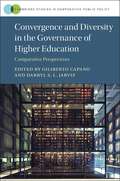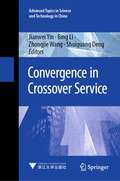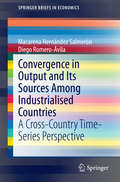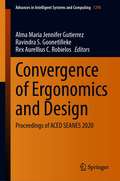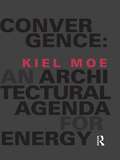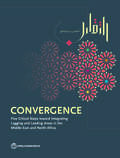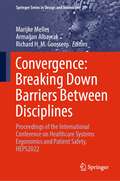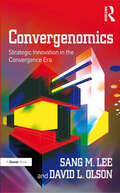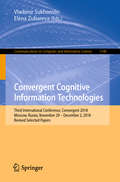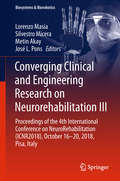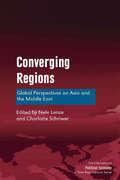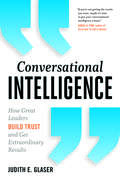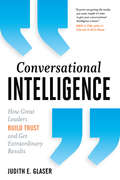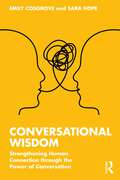- Table View
- List View
Convergence and Diversity in the Governance of Higher Education: Comparative Perspectives (Cambridge Studies in Comparative Public Policy)
by Giliberto Capano Jarvis, Darryl S. L.For several decades, higher education systems have undergone continuous waves of reform, driven by a combination of concerns about the changing labour needs of the economy, competition within the global-knowledge economy, and nationally competitive positioning strategies to enhance the performance of higher education systems. Yet, despite far-ranging international pressures, including the emergence of an international higher education market, enormous growth in cross-border student mobility, and pressures to achieve universities of world class standing, boost research productivity and impact, and compete in global league tables, the suites of policy, policy designs and sector outcomes continue to be marked as much by hybridity as they are of similarity or convergence. This volume explores these complex governance outcomes from a theoretical and empirical comparative perspective, addressing those vectors precipitating change in the modalities and instruments of governance, and how they interface at the systemic and institutional levels, and across geographic regions.
Convergence and Persistence in Corporate Governance
by Jeffrey N. Gordon Mark J. RoeCorporate governance is on the reform agenda all over the world. Is the Anglo-American model of shareholder capitalism destined to become the global corporate governance standard or will important differences persist? Well-known scholars address this question with sophisticated political economy analysis geared to the legal frameworks. The Enron scandal has stirred up an urgent round of corporate governance questioning. Will it stop a convergence that was in the works? This volume offers interesting insights into this question.
Convergence in Crossover Service (Advanced Topics in Science and Technology in China #68)
by Bing Li Zhongjie Wang Jianwei Yin Shuiguang DengConvergence in crossover service explores the crossover phenomenon, crossover services and the convergence issues that arise in typical crossover scenarios. Unlike traditional service integration, crossover services need to realize multidimensional convergence of pattern, design, run-time environment, quality, and value. This book creatively proposes a framework of crossover service pattern modeling, simulation, evaluation, and convergence to achieve quantitative calculation and analysis of crossover service patterns. Also, this book provides a requirements convergence modeling and analysis framework to support crossover services requirements analysis and design. In the meantime, authors develop a new crossover service network architecture to achieve efficient governance of large-scale crossover services and construct an evaluation and optimization system for service quality and value. In the case of the rural Taobao scenario, the theory and engineering methods presented in this book can provide better solutions for crossover convergence. This book is of great interest to researchers and academics wishing to see what crossover services are, how they are implemented, and what benefits they bring.
Convergence in Emerging Europe: Sustainability and Vulnerabilities
by Athanasios VamvakidisA report from the International Monetary Fund.
Convergence in Output and Its Sources Among Industrialised Countries: A Cross-Country Time-Series Perspective (SpringerBriefs in Economics)
by Diego Romero-Ávila Macarena Hernández SalmerónThis book investigates the existence of stochastic and deterministic convergence of real output per worker and the sources of output (physical capital per worker, human capital per worker, total factor productivity -TFP- and average annual hours worked) in 21 OECD countries over the period 1970-2011. Towards this end, the authors apply a large battery of panel unit root and stationarity tests, all of which are robust to the presence of cross-sectional dependence. The evidence fails to provide clear-cut evidence of convergence dynamics either in real GDP per worker or in the series of the sources of output. Due to some limitations associated with second-generation panel unit root and stationarity tests, the authors further use the more flexible PANIC approach which provides evidence that real GDP per worker, real physical capital per worker, human capital and average annual hours exhibit some degree of deterministic convergence, whereas TFP series display a high degree of stochastic convergence.
Convergence of Ergonomics and Design: Proceedings of ACED SEANES 2020 (Advances in Intelligent Systems and Computing #1298)
by Ravindra S. Goonetilleke Alma Maria Jennifer Gutierrez Rex Aurellius C. RobielosThis book presents the proceedings of the Joint Conference of the Asian Council on Ergonomics and Design and Southeast Asian Network of Ergonomics Societies (ACED SEANES), held on December 2-4, 2020. By highlighting the latest theories and models, as well as cutting-edge technologies and applications, and by combining findings from a range of disciplines including engineering, design, robotics, healthcare, management, computer science, human biology and behavioral science, it provides researchers and practitioners alike with a comprehensive, timely guide on human factors and ergonomics. It also offers an excellent source of innovative ideas to stimulate future discussions and developments aimed at applying knowledge and techniques to optimize system performance, while at the same time promoting the health, safety and wellbeing of individuals. The proceedings include papers from researchers and practitioners, scientists and physicians, institutional leaders, managers and policy makers that contribute to constructing the Human Factors and Ergonomics approach across a variety of methodologies, domains and productive sectors.
Convergence: An Architectural Agenda For Energy
by Kiel MoeConvergence is based on the thermodynamic premise that architecture should maximize its ecological and architectural power. No matter how paradoxical it might initially seem, architects should maximize energy intake, maximize energy use, and maximize energy feedback and reinforcement. This presumes that the necessary excess of architecture is in fact an architect’s greatest asset when it comes to an agenda for energy, not a liability. But how do we start to understand the full range of eco-thermodynamic principles which need to be engaged with in order to achieve this? Kiel Moe explicates three factors: materials, energy systems and amortization. When these three factors converge through design, the resulting buildings begin to perform in complex, if not subtle, ways. By drawing on a range of architectural, thermodynamic, and ecological sources as well as illustrated and well-designed case studies, the author shows what architecture stands to gain by simultaneously maximizing the architectural and ecological power of buildings. .
Convergence: Five Critical Steps toward Integrating Lagging and Leading Areas in the Middle East and North Africa
by World Bank GroupPolicy makers across the Middle East and North Africa have for many years articulated plans to integrate their people spatially and economically. Wishing to bring communities together and narrow economic gaps, governments have made large capital investments in transport corridors and “new cities.†? Hoping to provide jobs in places with little economic activity, governments have designated new industrial zones supported by spatially targeted business incentives. Yet the results of these place-based initiatives in MENA are limited. The disparities between capital cities and lagging areas, and between richer and poorer quarters of cities, remain stark. Across much of the region, a fortunate few are connected to opportunity, while many more people are marginal to the formal economy—or live outside it, seemingly forgotten. Why have place-based spatial initiatives in MENA countries largely underdelivered, not yielding more sustainable jobs and growth? Although the challenges are many and vary across the region, this book explains that many of these place-based policies get one thing wrong: they attempt to treat inequity‘s spatial and physical symptoms, not its causes. This book presents the five roots causes of spatial inequity in institutional inefficiencies across MENA—urban regulatory frictions, credentialist education systems, centralized control over local public services, barriers to the spatial mobility of goods and people, and barriers to market entry and lopsided business environments—within cities, within countries, and across national borders
Convergence: Proceedings of the International Conference on Healthcare Systems Ergonomics and Patient Safety, HEPS2022 (Springer Series in Design and Innovation #30)
by Richard H. M. Goossens Marijke Melles Armaĝan AlbayrakThis book presents the proceedings of the 7th conference Healthcare Systems Ergonomics and Patient Safety (HEPS), held in Delft, The Netherlands on November 2-4, 2022, which was endorsed by the International Ergonomics Association (IEA). Contributions focus on the integration of knowledge, methods, and expertise from the disciplines of Human Factors/Ergonomics and of Medicine and Health in order to contribute to a safe and humane, high-quality healthcare system. Through breaking down the barriers between disciplines, they foster a framework of scientific knowledge, expertise and best practices to create the future of health and healthcare. The proceedings include papers from researchers and practitioners, scientists and physicians, institutional leaders, managers and policy makers that contribute to constructing the Human Factors and Ergonomics approach across a variety of methodologies, domains and productive sectors.
Convergence: The Redesign of Design (AD Smart)
by Randy Deutsch"There is today a pronounced and accelerated convergence in architecture. This convergence is occurring by doers not thinkers; in practice not academia; in building design, fabrication, and construction. It is about solution-centric individuals engaged in real time problem solving, not in abstractions. The nature of this convergence, where things are converging and what that means for architecture, is the subject of this book."—from the IntroductionThose working in architecture and engineering feel pressure to work faster, at lower cost, while maintaining a high level of innovation and quality. At the same time, emergent tools and processes make this possible. Convergence is about the firms, teams and people who thrive in this environment as a result of their ability to creatively combine and innovate. It seeks to answer several timely questions: What are the tools and work processes that are converging? How are individuals and organizations converging their tools and work processes? What challenges and benefits are they seeing? What is the ultimate endgame of this convergence? What skillsets and mindsets would someone need to develop to work effectively in this changing environment? What are the implications of convergence on the role of the designer, and on design? On how we design, build, fabricate, and construct? On how we work? The book explains how convergence relates to, but ultimately differs from integration, consolidation, multi-tasking, automation, and other forms of optimization. The practice-based research builds upon the author’s research in BIM and in the collaborative leveraging of data in design and fabrication. As an investigation and meditation on the impact of technology on the education and making of design professionals Convergence explains what is happening in the world of design, and discusses the implications for the future of education, training and practice.
Convergenomics: Strategic Innovation in the Convergence Era
by David L. Olson Sang M. LeeConvergenomics is about the megatrends that are shaping how people behave and organizations work. In this insightful analysis, Sang Lee and David Olson describe how globalization, digitization, changing demographics, changing industry mix, deregulation and privatization, commoditization of processes, new value chains, emerging new economies, deteriorating environment, and cultural conflicts have led to what they define as a convergence revolution. Lee and Olson discuss this convergence revolution from the perspectives of technology, industry, knowledge, open-source networking and bio-artificial convergence, and they explain how human systems are transformed by what they have named convergenomics. Understanding convergenomics can lead to innovative strategic approaches and, the authors contend, more agile businesses are already employing these approaches to become and remain competitive and to generate greater value in a world radically changed by e-commerce. Business leaders and 'students' of strategy at all levels will learn from this book how revolutionary developments can be embraced rather than feared, and how technology that is potentially frightening in its complexity can be harnessed and used to enable productive collaboration and gain competitive advantage.
Convergent Cognitive Information Technologies: Third International Conference, Convergent 2018, Moscow, Russia, November 29 – December 2, 2018, Revised Selected Papers (Communications in Computer and Information Science #1140)
by Vladimir Sukhomlin Elena ZubarevaThis book constitutes the refereed proceedings of the Third International Conference on Convergent Cognitive Information Technologies, Convergent 2018, held in Moscow, Russia, in December 2018. The 26 revised full papers and 9 short papers were carefully reviewed and selected from 147 submissions. The papers of this volume are organized in topical sections on theoretical questions of computer science, computational mathematics, computer science and cognitive information technologies; cognitive information technologies in control systems; big data and applications; the Internet of Things (IoT): standards, communication and information technologies, network applications; smart cities: standards, cognitive-information technologies and their applications.- cognitive information technologies in the digital economics.- digital transformation of transport.
Convergent Media and Privacy (Palgrave Global Media Policy and Business)
by Tim DwyerA lot of personal data is being collected and stored as we use our media devices for business and pleasure in mobile and online spaces. This book helps us contemplate what a post-Facebook or post-Google world might look like, and how the tensions within capitalist information societies between corporations, government and citizens might play out.
Converging Clinical and Engineering Research on Neurorehabilitation III: Proceedings of the 4th International Conference on NeuroRehabilitation (ICNR2018), October 16-20, 2018, Pisa, Italy (Biosystems & Biorobotics #21)
by Metin Akay José L. Pons Lorenzo Masia Silvestro MiceraThe book reports on advanced topics in the areas of neurorehabilitation research and practice. It focuses on new methods for interfacing the human nervous system with electronic and mechatronic systems to restore or compensate impaired neural functions. Importantly, the book merges different perspectives, such as the clinical, neurophysiological, and bioengineering ones, to promote, feed and encourage collaborations between clinicians, neuroscientists and engineers. Based on the 2018 International Conference on Neurorehabilitation (ICNR 2018) held on October 16-20, 2018, in Pisa, Italy,, this book covers various aspects of neurorehabilitation research and practice, including new insights into biomechanics, brain physiology, neuroplasticity, and brain damages and diseases, as well as innovative methods and technologies for studying and/or recovering brain function, from data mining to interface technologies and neuroprosthetics. In this way, it offers a concise, yet comprehensive reference guide to neurosurgeons, rehabilitation physicians, neurologists, and bioengineers. Moreover, by highlighting current challenges in understanding brain diseases as well as in the available technologies and their implementation, the book is also expected to foster new collaborations between the different groups, thus stimulating new ideas and research directions.
Converging Regions: Global Perspectives on Asia and the Middle East (The International Political Economy of New Regionalisms Series)
by Nele Lenze Charlotte SchriwerFor over a millennium, Asia and the Middle East have been closely connected through maritime activities and trade, a flourishing relationship that has given rise to new and thriving societies across the Indian Ocean region and Arabia. In recent times, with the global political and economic power shifts of the past decade, significant events in the Middle East and Asia have brought about fundamental global change; the Arab uprisings, the emergence of India and China as powerful global economies, the growing strength of various new Islamic movements, and serious financial uncertainties on a global scale have laid the foundations of a new world order between East and West. The current volume examines this renewed global dynamic, and how it is changing the relationships between the interdependent global communities across Asia and the Middle East. Focussing on the broader aspects of finance and trade between the Middle East and Asia, as well as growing security issues over natural resources and questions of sovereignty, this volume concludes with speculations on the growing importance of Asia and the Middle East in the global setting.
Conversation About Information Technology
by Andrew McafeeTwo managers discuss the benefits, costs, opportunities, and headaches of corporate computing. Topics include security, training, the Internet and Web, collaboration, productivity, Moore's Law, computer crashes, upgrades, open source software, network effects, enterprise computing, and competitive differentiation via IT.
Conversational Intelligence: How Great Leaders Build Trust & Get Extraordinary Results
by Judith E. GlaserThe key to success in life and business is to become a master at Conversational Intelligence. It's not about how smart you are, but how open you are to learn new and effective powerful conversational rituals that prime the brain for trust, partnership, and mutual success. Conversational Intelligence translates the wealth of new insights coming out of neuroscience from across the globe, and brings the science down to earth so people can understand and apply it in their everyday lives. Author Judith Glaser presents a framework for knowing what kind of conversations trigger the lower, more primitive brain; and what activates higher-level intelligences such as trust, integrity, empathy, and good judgment. Conversational Intelligence makes complex scientific material simple to understand and apply through a wealth of easy to use tools, examples, conversational rituals, and practices for all levels of an organization.
Conversational Intelligence: How Great Leaders Build Trust and Get Extraordinary Results
by Judith E. GlaserThe key to success in life and business is to become a master at Conversational Intelligence. It's not about how smart you are, but how open you are to learn new and effective powerful conversational rituals that prime the brain for trust, partnership, and mutual success. Conversational Intelligence translates the wealth of new insights coming out of neuroscience from across the globe, and brings the science down to earth so people can understand and apply it in their everyday lives. Author Judith Glaser presents a framework for knowing what kind of conversations trigger the lower, more primitive brain; and what activates higher-level intelligences such as trust, integrity, empathy, and good judgment. Conversational Intelligence makes complex scientific material simple to understand and apply through a wealth of easy to use tools, examples, conversational rituals, and practices for all levels of an organization.
Conversational Marketing: How the World's Fastest Growing Companies Use Chatbots to Generate Leads 24/7/365 (and How You Can Too)
by David Cancel Dave GerhardtReal-time conversations turn leads into customers Conversational Marketing is the definitive guide to generating better leads and closing more sales. Traditional sales and marketing methods have failed to keep pace with the way modern, internet-savvy consumers purchase goods and services. Modern messaging apps, which allow for real-time conversations and instant feedback, have transformed the way we interact in our personal and professional lives, yet most businesses still rely on 20th century technology to communicate with 21st century customers. Online forms, email inquiries, and follow-up sales calls don’t provide the immediacy that modern consumers expect. Conversational marketing and sales are part of a new methodology centered around real-time, one-on-one conversations with customers via chatbots and messaging. By allowing your business to communicate with customers in real time—when it’s most convenient for them—conversational marketing improves the customer experience, generates more leads, and helps you convert more leads into customers.Conversational Marketing pioneers David Cancel and Dave Gerhardt explain how to: Merge inbound and outbound tactics into a more productive dialog with customers Integrate conversational marketing techniques into your existing sales and marketing workflow Face-to-face meetings, phone calls, and email exchanges remain important to customer relations, but adding a layer of immediate, individual conversation drives the customer experience—and sales—sky-high.
Conversational Warfare and the Combat Mentality: How to Think Strategically About Difficult Conversations
by Holly WeeksWhen a conversation no longer seems simply hard, but feels threatening, confusing, and unpredictable, it starts to look like combat. When we're caught in a combat mentality, we think there are power rules that determine who will "win" - but they are not rules of nature. Instead of getting caught up in conventional rules about winning and losing, we must focus on strategy and skill. Good strategy is thinking and planning what we want to do and where we want to go in the conversation, while assuming we'll face obstacles.
Conversational Wisdom: Strengthening Human Connection through the Power of Conversation
by Emily Cosgrove Sara HopeConversation: the heartbeat of our organisations. Right now, we’re at risk of losing the art of doing it well. We need to radically change how we talk to each other, to create workplaces where people feel they belong and can thrive. This book will help you understand how to grow your conversational wisdom to create more inclusive and collaborative environments and to make work more meaningful. Conversations carry the greatest potential to impact culture, performance, brand, and engagement. Yet conversation is an under-rated and under-developed skill. Emily Cosgrove and Sara Hope have spent the last 25 years helping people and organisations strengthen human connection through the power of conversation. Drawing on their experience of working with organisations from global jewellers to charities, professional services to B Corporations, they share a wealth of tips, tools, stories, and case studies. Written in a style that is easy to understand, they offer advice on how to get the best out of conversations and get underneath some of the challenges we all face. This is essential reading for learning and development experts, people leaders, coaches and mentors, and HR managers.
Conversations About Visiting and Managing the National Parks: Crowdsourcing America’s Best Idea
by Robert Manning Dr Elizabeth E. PerryAs the popularity of the national parks grows, so do the challenges of visiting and managing them. This innovative book uses crowdsourcing - postings by park visitors on a range of social media sites - to start 100 conversations on issues associated with visiting and managing the national parks. The authors then use their experience and expertise to prepare short, plainspoken, and engaging essays that respond to the postings and complete the conversations. The book is written for park visitors, managers, and students. The authors are university professors who teach the history, philosophy, and management of national parks, conduct long-term programs of research for the National Park Service, and have spent years working and living in the national parks. This inventive, thoughtful, and inviting book addresses a wide range of national park-related issues, guides readers on how to more effectively plan and conduct their national park visits, informs park planners and managers about what visitors think about the parks, introduces the latest scientific and professional information on park management, helps prepare students for careers in park management, and enhances public appreciation and protection of the national parks. Preservation of our national parks has always required an active engagement with the public. The authors take this to a new level by responding directly to the many questions and comments posed by visitors on social media with thoughtful and informative responses. Jonathan B. Jarvis, eighteenth Director of the National Park Service
Conversations Behind the Kitchen Door: 50 American Chefs Chart Today’s Food Culture
by Emmanuel LarocheConversations Behind the Kitchen Door offers an insider’s look into culinary trends through the words of acclaimed and professionally recognized chefs.
Conversations That Sell: Collaborate with Buyers and Make Every Conversation Count
by Nancy BleekeThis book introduces sales professionals to the collaborative conversation skills they need to?capture the buyer's attention and secure business.Today's buyers want more from sales professionals than a simple consultation. What they're hungry for are?meaningful, collaborative conversations?built on mutual value and trust, that result in a win...where they, the seller, and the organization, achieve a winning outcome. Based on the author's five-step sales system, What's in It for Them (WIIFT) - Wait, Initiate, Investigate, Facilitate, Then Consolidate - Conversations That Sell shows you how to:Prepare for an?effective sales call - Identify sales opportunities and the factors that?drive buyers to actAdjust their approach?to the type of buyer - Achievers, Commanders, Reflectors, and ExpressersMake conversations flow easily - Address problems, opportunities, wants, and needsWork through objections - Advance and close sales; and morePacked with valuable tools and examples, salespeople in all industries will discover how to increase their short- and long-term sales success by keeping the focus of every conversation where it belongs…on the buyer.
Conversations With My Unbelieving Friend
by Michael GayleVery few topics generate as much emotion as religious beliefs. Those with religious inclinations and those who are against religion frequently embrace their particular viewpoint on the basis of information, much of which may be incorrect. This holds true for both believers and non-believers. Through a series of semi-fictitious conversations, Michael Gayle seeks to address some of the issues which influence an individual&’s worldview. For the non-believers, this is useful in clarifying any misconceptions which may be preventing them from even considering Christianity. For believers, it provides at least two useful functions. First of all, it may help to clarify their own misconceptions and thus strengthen their faith. Secondly, it helps to provide them with information which they can use in their own conversations with non-believers that they will encounter in their Christian walk.The format is that of a series of semi-fictitious conversations between the author and a fictitious friend. The conversations represent dramatizations of the content of real conversations that the author has had over the years, combined with issues which he has deliberated on himself. In a number of instances, he addresses topics in respect of which he found the traditional explanations to be unconvincing, even though they may have been correct. If someone does not believe in the veracity Bible, it will be difficult to try to convince them of the truth of a statement in the Bible, on the basis that because it is in the Bible, therefore by definition it must be true. The author has encountered this approach and was himself, unconvinced thereby. Accordingly, whilst not denying the truth of the Bible, he has taken a different approach to some of these issues, and approach which is practical, reasonable and defensible. In so doing, his hope is that he will be able to clarify some of the issues which have caused many people to arrive at misconceptions related to the Bible and Christianity. In a very light-hearted manner, he addresses such issues as atheism, blind faith, evolution, intelligent design, miracles, science, biblical accuracy and a number of other topics which are typically the subject of disagreement or misunderstanding.This is intended to be the first in a series of three or more books. The intention of this first volume is not necessarily to convert anyone to Christianity. The intention is to remove any obstacles which are preventing anyone from honestly rather than emotionally evaluation the validity of Christian beliefs. Of course, there is the hope and possibility that some will be converted as a result, but that is not the primary objective. The conversations will continue in the subsequent volumes and maybe, just maybe, some may find the subject matter sufficiently compelling so that they are prepared to open up their hearts to the Lord.
